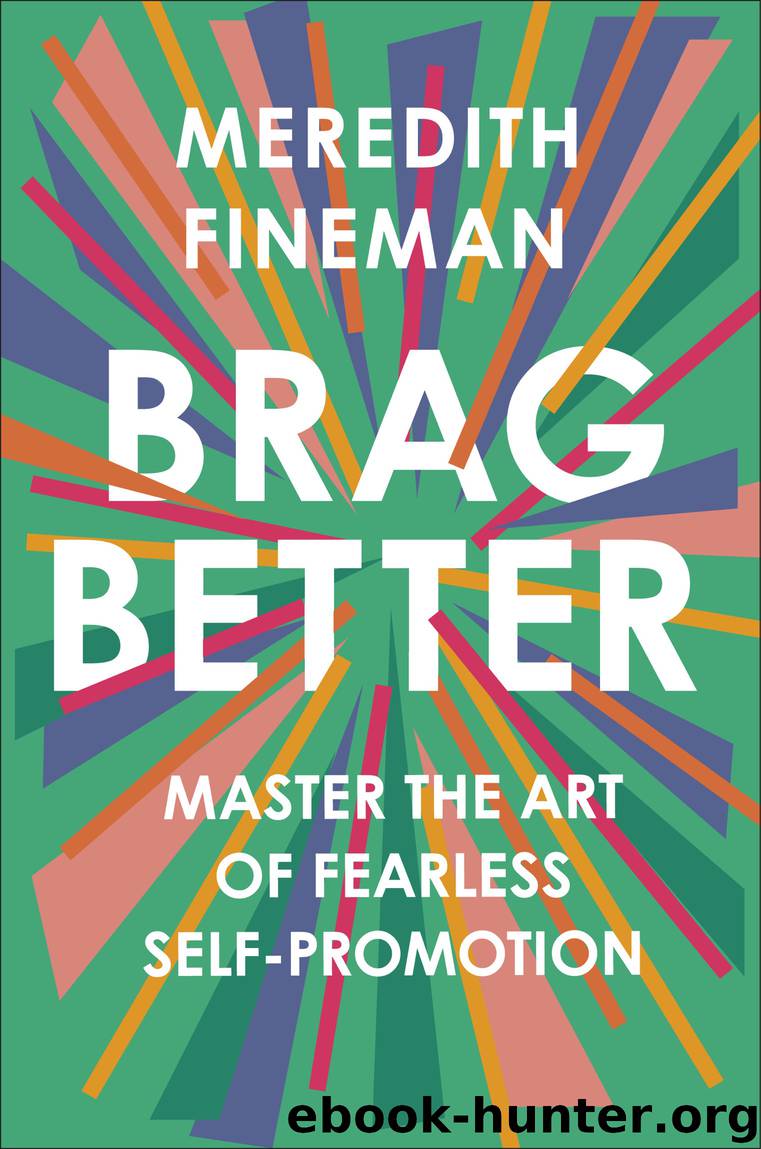Brag Better by Meredith Fineman

Author:Meredith Fineman [Fineman, Meredith]
Language: eng
Format: epub
Publisher: Penguin Publishing Group
Published: 2020-06-16T00:00:00+00:00
Your Story
The most important part of pitching yourself and your work is the story you tell and the timeliness of it. Humans digest storytelling—that’s how we process information, learn to form opinions, and see the world. The better a story holds our attention, the more likely we are to recall it, tell it to others, and remember it for years to come. Every great PR pro knows this—and here’s what they do to tell the best story possible.
BE SPECIFIC
You need to be as concrete and specific as possible. You may know that Bragging Better can be hard, but if I don’t include something like the following in my description, it’s just not as effective: “Have you ever been in a business development meeting and not been able to sell yourself or felt bad about your pitch? Well, that’s what I’m here to fix.” Not only does a turn of phrase like this put my work into terms people can understand, but it also allows them to empathize with the problem and consider it for themselves. Or if I say, “Do you ever feel like there’s someone in your industry that always gets the recognition, when you know more than they do? Aren’t you sick of that?” (This always works resoundingly.) Sometimes I lead with frustration around our environment, like, “Do you feel like everyone is yelling and we are rewarding them? I can help you navigate that system.” (The answer is always yes.)
Pitching well demands that you use as many illustrative examples as you can so that people can latch on to you and your work. Make your stories specific, colorful, and thoughtful. Show, don’t tell, or at least show and tell. We consume stories through vivid storytelling; you know that a key issue will be better remembered through a riveting Netflix documentary than through a series of wonky articles. It’s how we process and remember things.
In a now-classic psychological experiment from the late 1960s, researcher Allan Paivio found that when people were shown a rapid series of images and words, they were better able to remember the images than the words. These findings and many similar studies led to what is known as the dual coding theory, which states that verbal and visual information are processed differently in our brains. The theory states that coding some piece of information both ways—using words and images—increases the odds that we will remember that information later. And even within the verbal realm, several studies have shown that concrete words are more memorable than abstract words. So when you’re bragging about your accomplishments, make sure your story comes alive with vivid vocabulary and visual imagery.
Download
This site does not store any files on its server. We only index and link to content provided by other sites. Please contact the content providers to delete copyright contents if any and email us, we'll remove relevant links or contents immediately.
Rewire Your Anxious Brain by Catherine M. Pittman(18656)
Talking to Strangers by Malcolm Gladwell(13370)
The Art of Thinking Clearly by Rolf Dobelli(10489)
Mindhunter: Inside the FBI's Elite Serial Crime Unit by John E. Douglas & Mark Olshaker(9344)
Becoming Supernatural by Dr. Joe Dispenza(8217)
Change Your Questions, Change Your Life by Marilee Adams(7783)
Nudge - Improving Decisions about Health, Wealth, and Happiness by Thaler Sunstein(7709)
The Road Less Traveled by M. Scott Peck(7603)
The Lost Art of Listening by Michael P. Nichols(7506)
Mastermind: How to Think Like Sherlock Holmes by Maria Konnikova(7347)
Enlightenment Now: The Case for Reason, Science, Humanism, and Progress by Steven Pinker(7314)
Win Bigly by Scott Adams(7199)
The Way of Zen by Alan W. Watts(6614)
Daring Greatly by Brene Brown(6514)
Big Magic: Creative Living Beyond Fear by Elizabeth Gilbert(5774)
Grit by Angela Duckworth(5615)
Ego Is the Enemy by Ryan Holiday(5450)
Men In Love by Nancy Friday(5240)
The Laws of Human Nature by Robert Greene(5208)
